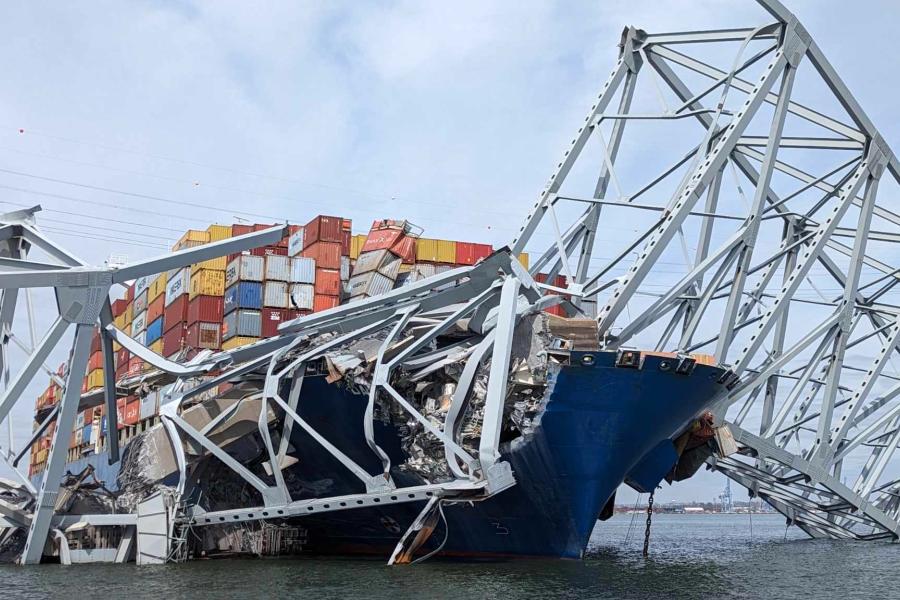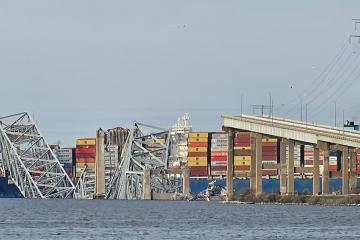- Name
- Johns Hopkins Media Relations
- jhunews@jhu.edu
- Office phone
- 443-997-9009
Tinglong Dai is a professor of operations management and business analytics at the Johns Hopkins Carey Business School whose research interests include global supply chains.
Early Tuesday, Baltimore's Francis Scott Key Bridge collapsed into the Patapsco River after one of its supports was struck by a container ship, causing the structure to break apart. The bridge, which opened in 1977, spanned the river at the entrance to Baltimore's harbor, home to the Port of Baltimore, a major hub for East Coast shipping operations. The bridge collapse will halt the flow off ships in and out of the port indefinitely, officials said, a development with the potential to damage the local economy and put strain on supply chains for automobiles and other goods.
What impact do you anticipate the bridge collapse will have on supply chains?
With the largest auto port in the U.S., Baltimore is a vital part of the global automotive supply chain. Baltimore is like Taylor Swift in the universe of U.S. auto ports, and when she's not performing as usual, even for a few weeks, the world feels a great loss. We're talking more than 800,000 vehicles a year, a lot of cars imported from Europe and Mexico, and a lot of cars exported by Detroit automakers.

Image caption: Tinglong Dai
Now that cargo ships have stopped coming in and out of the port, the impact is felt immediately as many automakers rush to divert their cargo ships that are on their way. It's worth noting that not all manufacturers have been affected. BMW and Volkswagen, for example, aren't affected as much as others because their distribution centers are on the side of the harbor, beyond the bridge and closer to the bay.
The Port of Baltimore is not just a successful auto port; it's a model port that President Biden touted in November 2021 when the nation was in a deepening supply chain crisis. Its growth is almost unstoppable in today's geopolitical context. The ongoing transition of global supply chains means more nearshoring and friend-shoring, doing more business with our "neighbors" like Mexico and "friends" like European countries and Japan. The Port of Baltimore is perfectly suited for that. So I think this big hit in the short term will not diminish the port's glory as the largest port near the nation's capital. There is so much growth ahead.
Of course, the port isn't just the port. We've got an ecosystem built surrounding the port. The ripple effect on the trucking industry and the intermodal transportation networks can be greater. And the collapse created a major disruption to the logistics networks of companies like Amazon, which has a strong local footprint and relies on Baltimore as a major logistics hub on the East Coast. But the robustness of these networks and the agility of their supply chain practices point to a rapid recovery.
What impact might this have on consumers, and are there remedies that could help mitigate these effects?
Rerouting decisions are already underway and will continue for months to come. But as a specialized port, the Port of Baltimore has unique strengths and complementary assets that won't disappear overnight. Alternative ports like Brunswick, Georgia, and Norfolk, Virginia, won't be able to fully absorb the volume going through Baltimore.
The best way to mitigate the impact of the bridge collapse is for the federal government and the state of Maryland to expedite the rebuilding of the Key Bridge and the restoration of port operations. The slower these efforts are, the more damage will be done to the local community. There has to be a sense of urgency, because we're talking about hundreds of thousands of people whose livelihoods depend on the immediate and long-term future of the port.
On the consumer side, we're likely to see delays in delivery in some cases, depending on how quickly vehicle inventories are depleted, and perhaps price increases in certain cases. However, given the resilience we've built into our supply chains since the early 2020s, any disruptions should be less significant. The supply chain has shown a robustness in 2024 that was not as pronounced in previous years.
Do you foresee any lingering economic impacts?
I don't see any lasting, major impact on the economy, whether it's local, regional, or national. Unless, of course, the recovery is relentlessly slow. It's not a forecasting problem; it's a decision problem. Every decision we make at the federal level, in the state of Maryland, in Baltimore, in local businesses, in global businesses, will affect the future of our economy. It's up to us. But the Port of Baltimore and its surrounding economy is in a strong position to win the future of the global supply chain transition, for geopolitical reasons, for operational efficiencies, and for other reasons.
Posted in Voices+Opinion, Politics+Society
Tagged transportation, supply chain, tinglong dai, 3-questions









